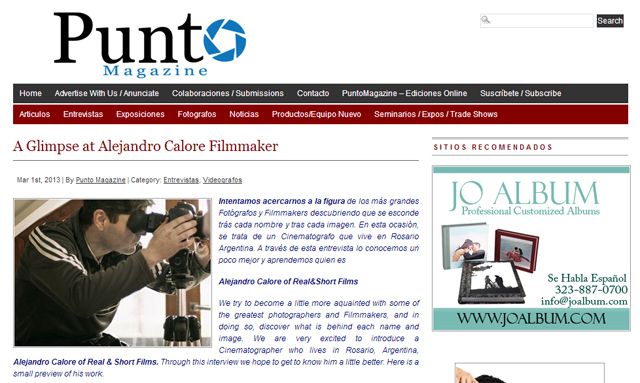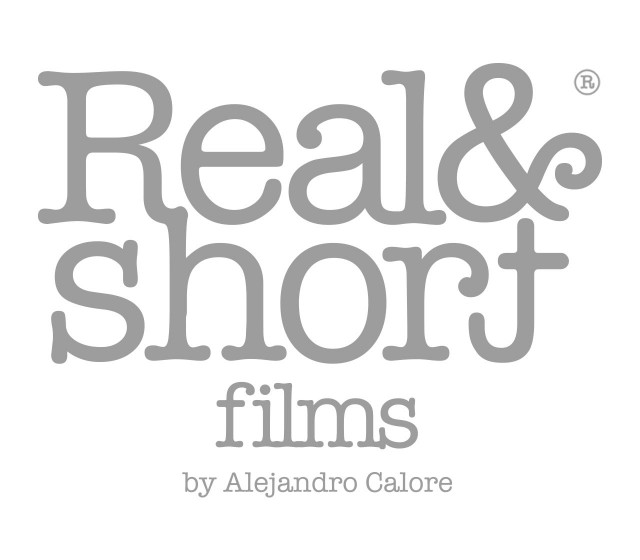
(Please go to PUNTOMAGAZINE.NET to read the full interview)
Tell us about Real&Short Films.
Real & Short was born just over three years, when I decided to take a turning point in my professional career, which was influenced by the emergence of DSLRs for filming. Interestingly, the technical revolution that these cameras signified allowed me to rethink my performative approach not only in a technical but also a comprehensive manner.
Alejandro Calore is the founder and owner of Real & Short (www.realnshort.com), independent production company based in the city of Rosario, province of Santa Fe, Argentina. It consists of two divisions:
+Real&Short Films (various productions) www.blog.realnshort.com
+Real&Short Weddings (Wedding Cinematography) www.realnshort.com
Have you always been a Videographer-Cinematographer, how did you begin?
I graduated from the School of Film and Television Provincial of Rosario in 1999. I started my career by participating in various media productions, covering technical and artistic roles, including my work as cameraman and editor of social events, first for studies, and then almost exclusively as a freelance filmmaker.
Currently Real & Short constitutes my personal project of 100% independent character.
What advice can you give in reference to audio?
I’ve always considered important recording ambient sound to give my work greater wealth. Undoubtedly, sound is half of our documentary work . And of course, recording the voices of our protagonists through wired microphones, or digital recorders when this is possible.
However, I believe that the creative development of the soundtrack during editing is also a valid strategy, the voices and direct sounds should not become barriers to our creativity. From an artistic perspective, everything can be subject to ongoing review. I consider that hearing clearly an “I do” at a wedding does not always represent to me a significant contribution in terms of story, no matter how proud I can feel with the quality of recorded audio.
As a creative person, you have to be true to your own vision. To the art. When you are at a wedding, up to which point can use your own creative expression?
I think it is about finding a balance between the expressive needs we have as filmmakers, and the needs of our customers. For Wedding Cinematography, for example, I recognize that there are certain moments whose recording seems to be unavoidable. However, I’ve noticed that the difference is not so much the “what” but “How” . How do we show creativity in a different manner–that which inevitably repeats itself at every wedding? And that’s where the personal artistic interests can find a suitable means of expression: in the “how”.
I think a wedding film should fully satisfy its author first, even make him cry. It is the guarantee that the final product will also create emotion in other people . It is an honest approach.
How do you focus before filming an event?
Contrary to my personal tendencies, I have concluded that I should not “plan” the filming/audio of a wedding. Let alone the making of a “script”. A social event is something live, which is constantly changing. It will never be fully possible to predict the mood of the couple, the degree of participation of the guests, the weather, or the general spirit the event will take on.
My philosophy is to pay attention and use intuition. Addressing a wedding documentation with pre conceived ideas may narrow dangerously our perception of it, causing us to lose unrepeatable moments.
During the event, do you film with editing in mind?
Regular exercise of this activity, coupled with the fact of certain constancy in the elements that integrate the ritual of a wedding, allows us to anticipate some situations as these develop. The idea of mentally editing them at some point is inevitable. However, I think it is a practice to which we should not succumb, since it tends to systematize the creative process.
No two weddings are alike, and my philosophy is to approach them as if each were the first, in hopes of of keeping out the preconceptions.
Besides the final finished movie, what else do you offer your clients?
The Wedding Film I offer always includes the implementation of a Trailer or Preview of it, which I edit in the days immediately following the event, and is the only material I make public on my blogsite and Facebook , since in addition to giving the bride and groom a first look of the film itself, it is a promotional tool for my work.
I also offer two other services besides Wedding Film: Pre-Wedding or E-session, and the Post-Wedding (one of its variations is the Trash The Dress). Both formats also become part of my blogsite and Facebook, as promotional material.
Any advice for someone starting out?
I am reluctant to give advice, in so far that they want to be equated with formulas. That said, I think it is very important to find a style, even if this is very different from the expectations of customers or colleagues.
I consider that the act of “copying” or “imitating” is inherent to a path that is initiated or is reformulated, and is a sign of reverence for an ideal one wishes, or intends to achieve. But as a long-term strategy, “Imitation” does not hold, and the products conceived in this way will lack of it’s own life, and eventually, will be a source of frustration for it’s authors.
Where do you see yourself in 10 years? Any future goals?
I would like in the future to find myself unafraid to rethink my way of seeing the world through the camera, each time I feel the need for a change of course. I feel that so far I’ve been true to that impulse, and this has taken me through wonderful roads. I hope the days to come find me transcending borders, both internal and external.
If you could travel anywhere in the world to film an event, where would it be?
I like the idea of applying my attention to the Wedding tradition in Europe, especially the fact of having locations like palaces, cathedrals, and Cottage style Weddings as typically seen in the UK.
A Cinematographer you would love to work with either living or dead?
In Wedding Cinematography, I’d love to witness the work of Patrick Moreau and Joe Simon, the filmmakers I learned much from by watching their work and listening to their interviews on the web.
As for filmmakers, I would have liked to witness the creative process of Stanley Kubrick, and have the privilege of witnessing a shooting day of Spielberg, who is known, to possess an incredible capacity for work.
